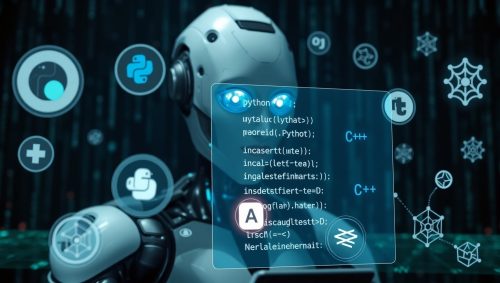In today’s fast-paced digital landscape, coding assistants have emerged as game changers in software development. These AI-powered tools ranging from GitHub Copilot and Tabnine to emerging players like Devin AI and Qodo are not only enhancing code quality but also dramatically improving developer productivity. In this blog post, we dive deep into the evolution, benefits, challenges, and future of coding assistants, and explore actionable steps for businesses and developers to fully harness their potential.
A Brief History and Evolution of Coding Assistants
The concept of coding assistants isn’t entirely new. Early code-completion tools offered simple auto-complete features that helped reduce syntax errors and speed up repetitive tasks. However, the landscape began to shift dramatically with the advent of artificial intelligence and large language models (LLMs).
From Auto-Completion to AI-Powered Solutions
In 2021, GitHub introduced GitHub Copilot, a tool powered by OpenAI’s Codex, that could generate entire code blocks from natural language prompts. This innovation marked a turning point, demonstrating that AI could understand context and generate relevant, functional code. Since then, tools like Tabnine have built upon these foundations by incorporating deep semantic understanding and personalized code suggestions, while emerging platforms like Devin AI and Qodo push the envelope further by integrating autonomous debugging, code planning, and even multi-agent operations.
These developments underscore a significant shift: coding assistants are no longer mere time-savers; they are becoming integral to the development lifecycle, effectively transforming how code is written, reviewed, and maintained.
How AI is Revolutionizing Software Development

The rise of coding assistants is reshaping the software development process in multiple, far-reaching ways. Here are the key areas of impact:
1. Boosting Developer Productivity
One of the most significant advantages of AI-powered coding assistants is the drastic reduction in development time. Studies have shown that developers using tools like GitHub Copilot can complete tasks up to 55% faster than those who do not rely on such technology. For instance, a controlled experiment demonstrated that developers with access to an AI pair programmer finished their coding tasks nearly 56% faster, effectively reducing the time spent on boilerplate and repetitive coding by up to 40% in some cases.
These productivity gains allow development teams to focus on complex problem-solving and innovative design rather than getting bogged down in routine coding tasks.
2. Enhancing Code Quality and Consistency
AI coding assistants not only speed up the coding process but also help improve code quality. They can suggest standardized code patterns, auto-generate documentation, and even highlight potential security vulnerabilities. By providing context-aware code suggestions, these tools assist developers in maintaining consistency across large codebases—a critical factor for enterprise-level projects.
3. Democratizing Software Development
Historically, mastering programming required years of rigorous training. Today, AI-powered coding assistants lower the entry barrier, empowering citizen developers and non-technical professionals to participate in software creation. With natural language interfaces, even beginners can describe a problem in plain English and receive functional code snippets that serve as a solid starting point. This democratization of coding not only broadens the talent pool but also fosters innovation by enabling diverse perspectives to contribute to software development.
4. Facilitating Collaboration and Continuous Learning
Coding assistants enhance team collaboration by simplifying code reviews, documentation, and knowledge sharing. They can generate summaries for pull requests, offer suggestions during pair programming sessions, and even provide explanations for legacy code. Such capabilities ensure that team members remain on the same page, thereby reducing onboarding time and accelerating the development process. Moreover, by automating mundane tasks, these tools free up time for continuous learning and upskilling, which are crucial in the rapidly evolving tech landscape.
Real-World Examples of Coding Assistants in Action

Several industry-leading coding assistants have already made significant strides in transforming software development:
GitHub Copilot
GitHub Copilot is arguably the most well-known AI coding assistant. Leveraging OpenAI’s Codex, it provides real-time code completions, suggestions, and even debugging support within popular integrated development environments (IDEs) like Visual Studio Code and JetBrains. Its ability to generate contextually relevant code based on natural language prompts has earned it widespread adoption across the developer community.
Tabnine
Originating as Codota, Tabnine rebranded to focus on AI-driven code completion across multiple programming languages and IDEs. With over one million users, Tabnine emphasizes privacy and security by operating under the control of engineering teams. It not only autocompletes code but also supports testing, documentation, and code explanations, making it a comprehensive tool for modern developers.
Emerging Platforms: Devin AI and Qodo
Recent entrants like Devin AI and Qodo represent the next generation of coding assistants. Devin AI has garnered attention for its autonomous capabilities—it can debug, plan, and even adjust its approach based on user feedback, effectively acting as an “AI software engineer.” Similarly, Qodo integrates code generation with automated code reviews and test generation, positioning itself as a quality-first code integrity platform. These tools are not only pushing the boundaries of what is possible but also raising important discussions about the future role of human developers in an AI-driven industry.
Benefits and Opportunities Offered by Coding Assistants
The integration of AI-powered coding assistants into the software development lifecycle brings a host of benefits that can significantly impact both individual developers and entire organizations:
Increased Efficiency and Reduced Time-to-Market
- Faster Coding: By automating repetitive tasks, coding assistants allow developers to focus on innovative solutions, reducing the overall time required to bring products to market.
- Streamlined Workflows: Tools that integrate seamlessly into existing IDEs help maintain the natural flow of coding, minimizing disruptions.
- Accelerated Onboarding: New team members can ramp up faster when coding assistants provide clear code examples and explanations, reducing the learning curve.
Enhanced Code Quality
- Consistent Standards: AI can enforce coding standards and best practices across teams, ensuring that code is clean, well-documented, and secure.
- Automated Testing: Coding assistants can generate test cases and even help in debugging, leading to more robust and error-free code.
- Real-Time Feedback: Immediate suggestions and corrections during code development lead to fewer errors and better overall quality.
Cost Savings
- Labor Efficiency: With productivity gains of 20-55% reported in various studies, organizations can achieve more with fewer resources, ultimately reducing operational costs.
- Reduced Technical Debt: Consistently high-quality code and automated refactoring reduce the long-term costs associated with maintaining legacy systems.
Democratization of Development
- Access for Non-Experts: By lowering the entry barrier, coding assistants enable a broader spectrum of individuals to contribute to software development, spurring innovation and inclusivity.
- Skill Development: These tools serve as an on-the-job learning resource, helping developers quickly understand new languages, frameworks, and coding paradigms.
Challenges and Considerations
While the benefits of coding assistants are numerous, it’s important to consider some of the challenges and potential pitfalls:
Quality and Reliability Concerns
- Accuracy Issues: Despite significant improvements, AI-generated code is not always perfect. Developers must still review and test AI outputs to ensure correctness and security.
- Over-Reliance: There is a risk that novice developers may become overly dependent on AI tools, potentially hindering their ability to learn fundamental coding skills.
Security and Copyright Issues
- Security Vulnerabilities: AI tools trained on publicly available code may inadvertently introduce insecure code or propagate known vulnerabilities. Robust review processes are essential to mitigate these risks.
- Intellectual Property: The training data used by many AI models raises complex copyright concerns. Organizations need to ensure that the code generated complies with licensing requirements.
Job Displacement Fears
- Evolving Roles: While AI is unlikely to replace developers entirely, it will undoubtedly change the nature of coding jobs. Junior developers, in particular, may face challenges if they rely too heavily on AI without developing a deep understanding of core programming principles.
However, industry experts believe that coding assistants will ultimately empower developers to focus on higher-level tasks such as architecture design, system optimization, and strategic planning.
The Future of Coding Assistants: Trends and Predictions
The rapid evolution of AI in software development signals exciting times ahead. Here are some emerging trends and predictions:
Integration of Multi-Agent Systems
Future coding assistants may evolve into full-fledged AI agents capable of reasoning, planning, and collaborating with human developers. Multi-agent systems, where one AI agent can delegate tasks to others, are on the horizon—potentially transforming how complex projects are managed.
Seamless Collaboration Across Teams
As AI tools become more integrated into the development lifecycle, we can expect a shift in how teams collaborate. Automated code reviews, intelligent documentation generation, and real-time debugging support will further streamline team workflows. This collaboration will not only boost productivity but also foster a culture of continuous learning and innovation.
Personalization and Customization
Coding assistants will likely become more personalized, adapting to the coding style, preferences, and project requirements of individual developers and teams. With options to choose different underlying AI models (such as GPT-4o or Claude 3.5), organizations will have the flexibility to select tools that best fit their unique needs.
Increased Investment and Industry Adoption
The growing funding and investments in AI coding assistants—nearly $1 billion in recent years—signal strong market confidence in these technologies. Major tech companies are actively integrating these tools into their development environments, and their adoption is expected to become ubiquitous in both startups and large enterprises.
Actionable Takeaways for Developers and Organizations
To fully leverage the potential of AI-powered coding assistants, here are some strategic recommendations:
For Developers
- Embrace the Learning Curve:
Invest time in understanding how your preferred coding assistant works. Experiment with different prompts and scenarios to learn its strengths and limitations. - Maintain Code Hygiene:
Always review AI-generated code for quality, security, and compliance. Use automated testing tools to verify that the code meets your project’s standards. - Expand Your Skill Set:
Use coding assistants as a learning tool. When you encounter unfamiliar code or languages, let the assistant help you bridge the knowledge gap while continuing to build your foundational skills. - Stay Updated:
The field of AI is rapidly evolving. Regularly update your knowledge about new tools, model improvements, and best practices to remain competitive in the market.
For Organizations
- Pilot and Scale:
Begin with pilot projects using coding assistants to gauge their impact on productivity and code quality. Gather feedback from your development teams before rolling out the tools organization-wide. - Integrate Seamlessly:
Ensure that your coding assistants integrate with your existing development environments and workflows. Tools that work natively with your preferred IDEs will reduce friction and increase adoption rates. - Invest in Training:
Provide comprehensive training sessions to help developers maximize the benefits of these tools. Workshops and hands-on sessions can accelerate the learning process and ensure that all team members are aligned. - Implement Robust Review Processes:
Establish clear guidelines and review processes to monitor the quality of AI-generated code. Regular code audits and security reviews can mitigate potential risks associated with over-reliance on AI. - Foster a Culture of Innovation:
Encourage your teams to experiment with new tools and techniques. Recognize and reward innovative uses of coding assistants that lead to measurable improvements in productivity and product quality.
Conclusion
The rise of AI-powered coding assistants marks a transformative moment in the evolution of software development. These tools are revolutionizing the industry by enhancing productivity, improving code quality, and democratizing the art of coding. While challenges such as security, quality control, and evolving job roles remain, the benefits far outweigh the risks—provided organizations and developers approach these technologies with a strategic, informed mindset.
As we look to the future, the integration of multi-agent systems, personalized coding experiences, and broader industry adoption will only deepen the impact of coding assistants. Whether you are an individual developer eager to streamline your workflow or a business leader looking to drive efficiency and innovation, now is the time to embrace this AI revolution.
By piloting coding assistants, investing in continuous training, and fostering a culture that values both human ingenuity and AI-powered efficiency, you can position your team at the forefront of a new era in software development.

